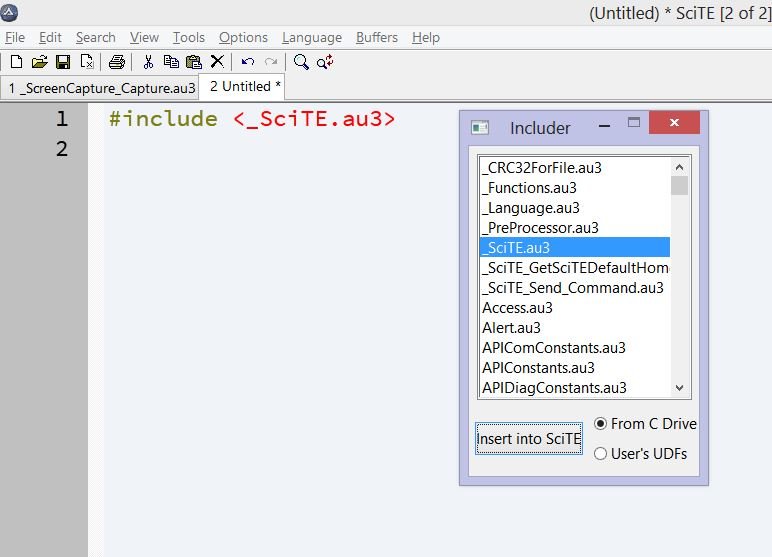Search the Community
Showing results for tags 'include files'.
-
When I started using AutoIt, I used to dump all the community UDFs as well as my own frequently-used scripts into C:\Program Files (x86)\AutoIt3\Include - - terrible idea, of course, and I wouldn't advise anyone to do this. These days I have the following folder structure for UDFs: - I have a folder C:\AutoIt which has subfolders: - - C:\AutoIt\MyLibraries, which has my own scripts, organized as C:\AutoIt\MyLibraries\MyUDFName\MyUDFName.au3 - - C:\AutoIt\CommunityLibraries, which has scripts from other forum members, organized as: C:\AutoIt\CommunityLibraries\CommunityMemberUsername\UDFName\UDFName.au3 For example, I've been playing around with TheXman's "jq" UDF, and this is the storage path: This in itself won't make everything run. Some UDFs will have hardcoded DLL paths which you'll have to edit. And finally, you'll have to make registry edits so you can #include these UDFs without entering the entire path. Here's what I did: #include <Array.au3> #include <File.au3> Global Const $CUSTOMINCLUDE_REGKEYNAME = "HKEY_CURRENT_USER\Software\AutoIt v3\AutoIt" Global Const $CUSTOMINCLUDE_REGKEYVALUENAME = "Include" Global Const $CUSTOMINCLUDE_REGKEYVALUETYPE = "REG_SZ" Global Const $FOLDER_COMMUNITYLIBRARIES = "C:\AutoIt\CommunityLibraries" Global Const $FOLDER_MYLIBRARIES = "C:\AutoIt\MyLibraries" Global $CUSTOMINCLUDE_REGKEYVALUE = "" Local $CommunityUsers = _FileListToArray($FOLDER_COMMUNITYLIBRARIES, "*", $FLTA_FOLDERS, False) _ArrayDelete($CommunityUsers, 0) Local $CommunityLibraries = 0 Local $UDFPath = "" For $i = 0 To UBound($CommunityUsers) - 1 $CommunityLibraries = _FileListToArray($FOLDER_COMMUNITYLIBRARIES & "\" & $CommunityUsers[$i], "*", $FLTA_FOLDERS, False) _ArrayDelete($CommunityLibraries, 0) For $j = 0 To UBound($CommunityLibraries) - 1 $UDFPath = $FOLDER_COMMUNITYLIBRARIES & "\" & $CommunityUsers[$i] & "\" & $CommunityLibraries[$j] If FileExists($UDFPath) Then $CUSTOMINCLUDE_REGKEYVALUE &= $UDFPath & ";" Next Next Local $MyLibraries = _FileListToArray($FOLDER_MYLIBRARIES, "*", $FLTA_FOLDERS, False) _ArrayDelete($MyLibraries, 0) For $j = 0 To UBound($MyLibraries) - 1 $UDFPath = $FOLDER_MYLIBRARIES & "\" & $MyLibraries[$j] If FileExists($UDFPath) Then $CUSTOMINCLUDE_REGKEYVALUE &= $UDFPath & ";" Next $CUSTOMINCLUDE_REGKEYVALUE = StringTrimRight($CUSTOMINCLUDE_REGKEYVALUE, 1) ConsoleWrite($CUSTOMINCLUDE_REGKEYVALUE) RegWrite("HKEY_CURRENT_USER\Software\AutoIt v3\AutoIt", "Include", "REG_SZ", $CUSTOMINCLUDE_REGKEYVALUE) This script scans the "CommunityLibraries" and "MyLibraries" folders and adds all the folder paths where the folder name matches the au3 file name to the registry. So far, it has worked out great for me, because now I can use this: #include <jq.au3> instead of: #include "C:\AutoIt\CommunityLibraries\TheXman\jq\jq.au3" Okay, that's all, I hope this'll be useful for newbies who want an easy system for storing their UDFs :)
-
Hi al, I have made a tool for including our desired au3 files to SciTE window. It will display all files in include directory in a list box. Just select an au3 file name and press the button. It will add the file name with "#include <>" to your SciTE editor. You need to click the desired line in SciTE and then run this exe (I have attached the rar file of this program) with a shortkey. Say Alt + I. And select your filename and click the button. Done. Includer.au3 Includer.rar Here is Includer Version 2 Includer2.au3





